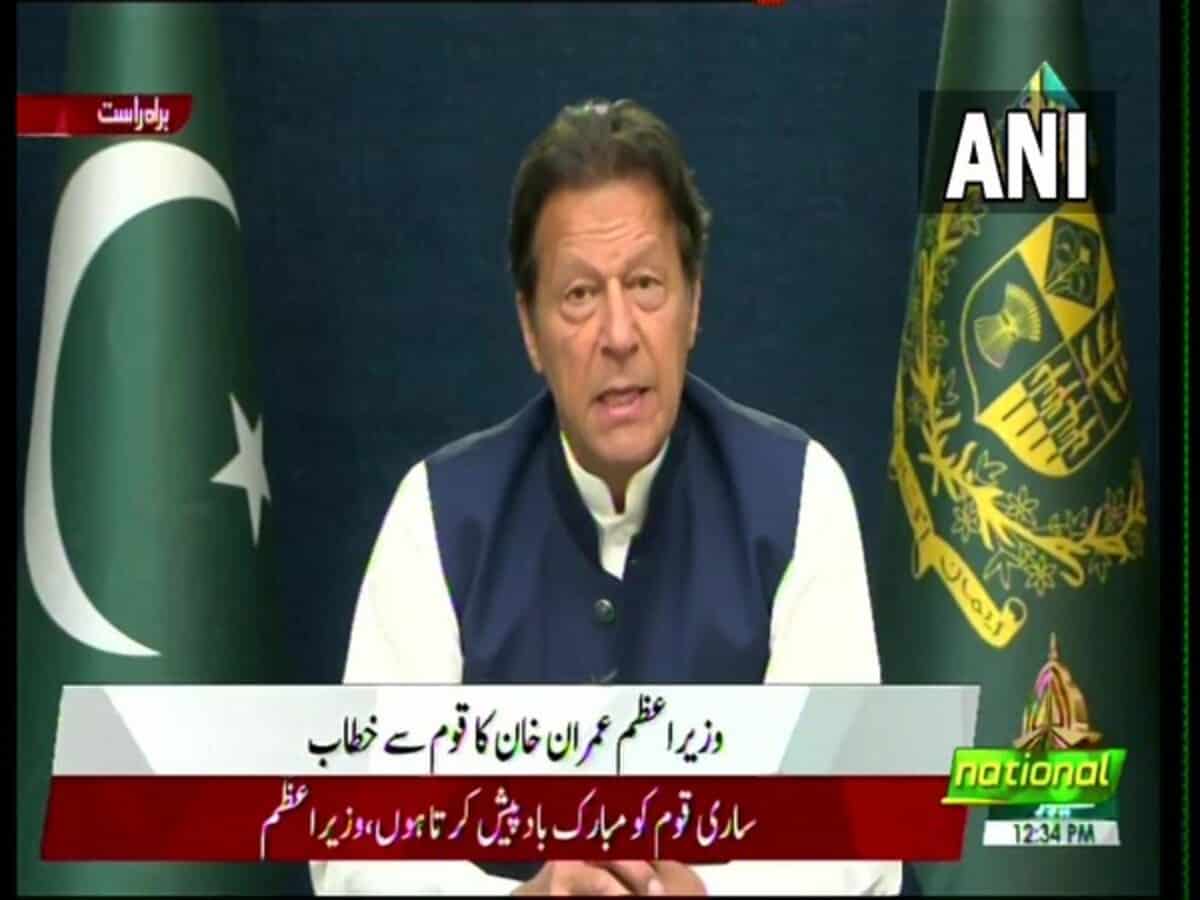
Islamabad: Pakistan Prime Minister Imran Khan shocked the Opposition by advising President Arif Alvi to dissolve National Assembly.
His announcement came moments after National Assembly Deputy Speaker Qasim Suri, who was chairing today’s session, dismissed the no-confidence motion against Prime Minister Imran Khan, terming it a contradiction of Article 5 of the Constitution.
“I have written to the President to dissolve the assemblies. There should be elections in a democratic way. I call upon the people of Pakistan to prepare for elections,” Khan said in an address to the nation.
Earlier, National Assembly Deputy Speaker Sadiq Sanjrani dissolved the house alleging “foreign conspiracy” and said that no-trust motion was ” unconstitutional”.
“I congratulate every Pakistani on the Speaker’s decision. The no-confidence motion was a foreign conspiracy against us. Pakistan should decide who should govern them,” Khan added.
Earlier it was reported that Imran Khan has offered to dissolve the assembly on the condition to withdraw the no-confidence motion against him.
Khan had said that he was given three options ahead of the no-trust vote by the “establishment” — resignation, holding early elections or facing the no-confidence motion.
The military establishment however denied the claim and said that it did not bring the Opposition’s options, and rather it was the federal Government that telephoned the top brass while asking for a meeting to discuss the ongoing political scenario, The News International reported.
The Chief of Pakistan Army Staff General Qamar Javed Bajwa and the Directive General (DG) of Inter-Services Intelligence (ISI) met Pakistan PM on Wednesday at the request of the ruling government, according to The News International citing sources.
Imran Khan has seemingly lost support both in the lower house of the legislature and the backing of the all-powerful Pakistan army.
Imran Khan received a massive blow when the PTI “lost the majority” in the National Assembly after losing its key ally in the coalition Muttahida Qaumi Movement Pakistan (MQM-P). The MQM on Wednesday announced that it had struck a deal with the opposition Pakistan People’s Party (PPP) and would support the no-trust vote in the 342-member National Assembly.
Pakistani Prime Minister Imran Khan Niazi is a former Pakistani cricketer, who after leading the country to victory in the 1992 World Cup Final, retired from cricket and joined politics. He is the founding Chairman of Pakistan Tehreek-e-Insaf (PTI).
His political front, which he founded in 1997, remained on the sidelines of Pakistani politics until he found favour with the military establishment, which began propping him after 2013, to counter the growing political assertion of the two traditional mainstream parties led by Sharif and the Bhutto families.
The military establishment is widely known to have given its tacit approval to Khan in 2016 when he organised a massive rally and threatened a lockdown of Islamabad over the Panama Papers leak which had implicated the then Prime Minister Nawaz Sharif. The rally propped Khan as a serious contender for power, who enjoyed the blessings of the all-important Pakistani Army.In 1997, he founded his own political party ‘Pakistan Tehreek-e-Insaf.
Khan contested for a National Assembly seat in October 2002 elections and served as a Member Parliament from NA- 71, Mianwali until 2007. In 2018, Imran Khan stormed to power in Pakistan by winning 176 votes.
Imran Khan, the seventh member of his family, was born on November 25, 1952, to a Pashtun family in Lahore, Pakistan. He attended Aitchison College in Lahore and later moved to Oxford for higher studies.
Hailing from a cricketing family, his cousins, Javed Burki and Majid Khan, both preceded him in going to Oxford and captaining Pakistan. Khan married Jemima Goldsmith, an English socialite, who converted to Islam on May 16, 1995, in Paris.
The marriage ended in divorce after eight years in June 2004 as Jemima Khan was allegedly unable to adapt to Pakistani culture.Khan started playing cricket at the age of 13. Initially playing for his college and later representing English county Worcester, he made his debut for Pakistan at the age of 18 during the 1971 English series at Birmingham.
Soon, he acquired a permanent place in the team. Khan achieved the all-rounder’s triple in 75 tests.His career came to an end after the first and only ODI World Cup victory for Pakistan in 1992 with a record of 3,807 runs and 362 wickets in Test cricket.
He founded Shaukat Khanum Memorial Trust in 1991, which actively worked on the research and development of cancer and other related diseases. He also founded the Shaukat Khanum Memorial Cancer Hospital and Research centre in 1994.
He passionately pursued healthcare interests in the wake of his mother’s untimely death, who died of cancer.Khan was awarded ‘The Cricket Society Wetherall Award’ in 1976 and 1980 for being the leading all-rounder in English first-class cricket.
He was also named as the Wisden Cricketer of the year in 1983 and received the ‘President’s Pride of Performance’ award in 1983.He also got the Sussex Cricket Society Player of the Year Award in 1985 and served as Unicef’s Special Representative for Sports during the 1990s. Khan was inducted in the ‘ICC Hall of Fame’ on July 14, 2010.
